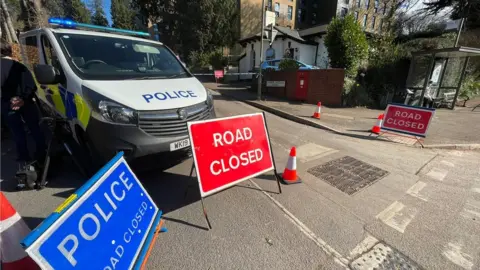Exeter WW2 bomb detonated after homes evacuated
A controlled detonation has been carried out on an unexploded World War Two bomb found in Exeter.
More than 2,600 households and University of Exeter halls of residence were evacuated after the device was found on Glenthorne Road on Friday.
Police declared a major incident and put up an initial 100m (330ft) cordon, extended to 400m (1,310ft).
Bomb disposal experts used 400 tonnes of sand to create an enclosing "box" before it was made safe at 18:12 GMT.
About 1,400 students were evacuated from 12 halls of residence after the explosive was found by builders on private land next to the Streatham campus at about 09:20 GMT on Friday.
Police said bomb disposal crews "worked through the night to establish a walled mitigation structure" and they had been expecting "a big bang" to be heard "quite a distance across Exeter" during the operation to make it safe.
 Devon and Cornwall Police
Devon and Cornwall PoliceThere were reports of it being heard five miles (8km) away.
The force said that, after the device was made safe and following assessments by utility companies, it was "anticipated that the majority of residents will be able to return home this evening".
The BBC's John Ayres said there had been "unusual scenes" of "hundreds of students with suitcases, all marching down the street towards St David's [railway] Station, away from the university and finding somewhere to go".
One student, Lucy, told the BBC she was in a hall just over 100m away from the scene when she and neighbours were told to leave at about 18:00 on Friday, given dinner and moved to hotels.
She said: "I didn't think it was that big a deal until I realised how big it was and how people were taking it so seriously."
The university said it was supporting "those who are affected until the situation is resolved and buildings are reopened".
It said on Friday night it could not say exactly how many students were moved as "obviously many students are not back on campus because of the Covid-19 situation".
Allow X content?
It tweeted on Saturday that anyone affected by the incident would need "to apply for mitigation for any forthcoming assessments" could "do so without the need to provide evidence".
One local resident, who did not have friends and family in the area to call on at short notice, was told on Saturday morning he would have to spend the time away in his car.
Ashley Attrell said: "You can't have the heater on all day in the car. There wasn't actually anywhere to go at all."
Police said Devon County Council and Exeter City Council staff had been working to "support those in private residences to find alternative accommodation, providing support to those who are particularly at-risk or vulnerable", police said.
Problems were reported on a helpline earlier in the day, but it was later running again.

Coastguard rescue officers, volunteers from Dartmoor Search and Rescue and members of disaster response charity Re:Act were among workers who helped with the evacuation.
Roads were closed in the area and city rail services disrupted as a result of the discovery.
The city was heavily attacked by German bombers in 19 raids during World War Two, particularly in May 1942 during the Baedecker Raids.

Follow BBC News South West on Twitter, Facebook and Instagram. Send your story ideas to [email protected].
